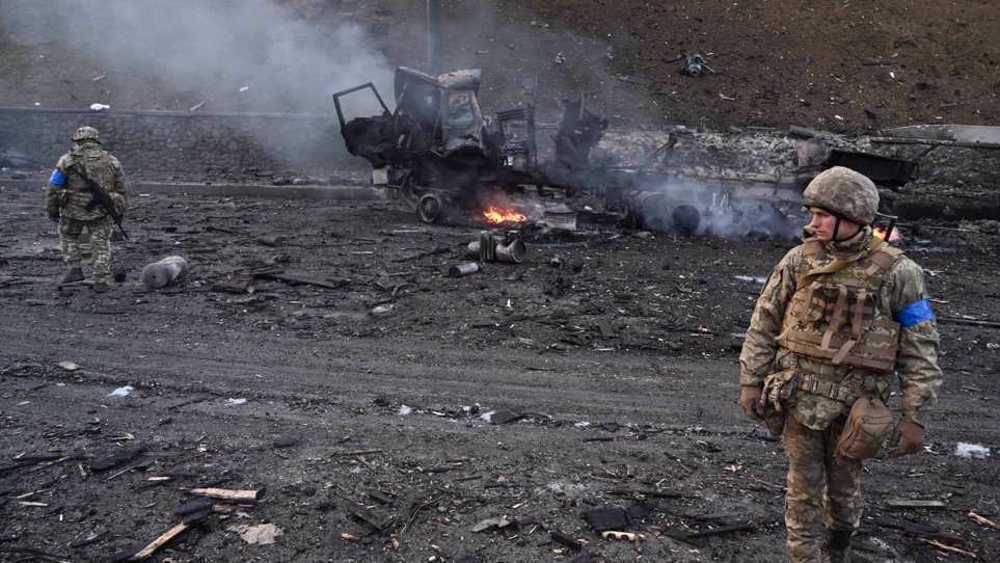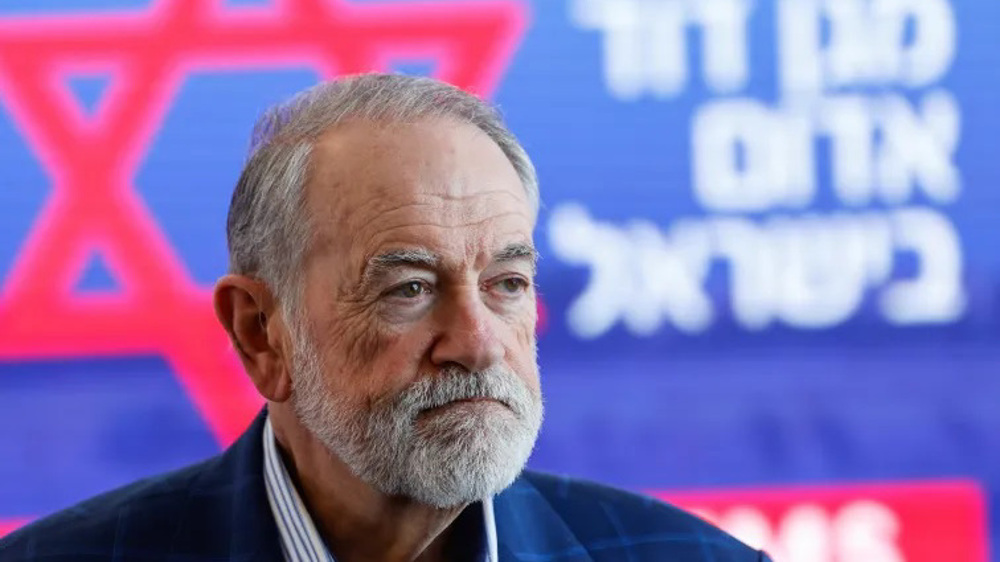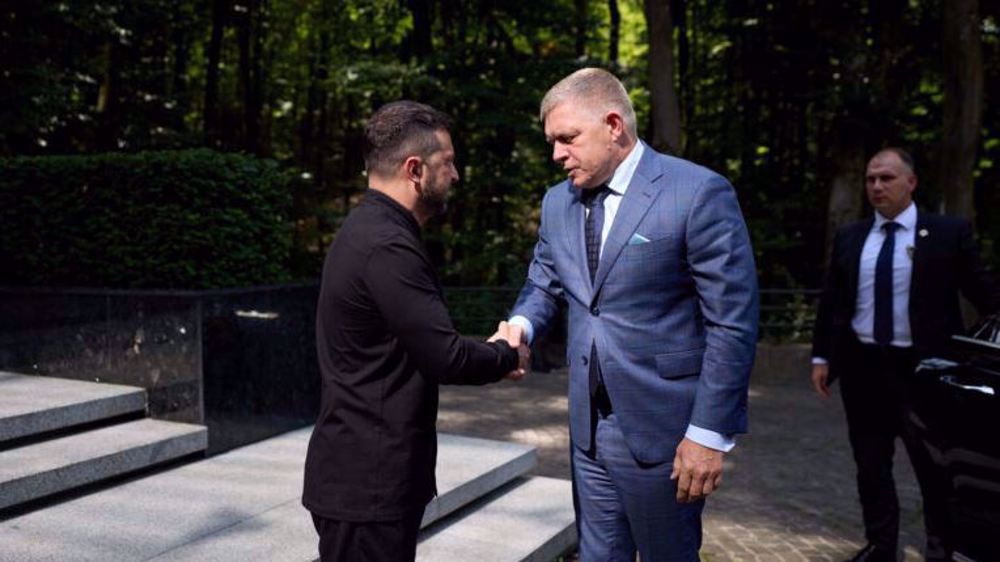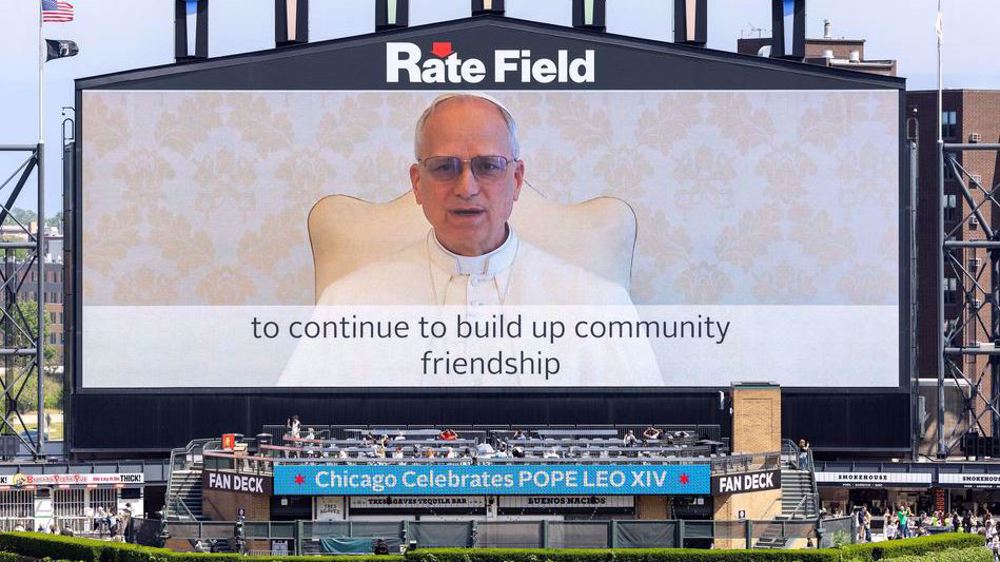UK prime minister visits Ukraine, promises to shower Kiev with military, financial aid
British Prime Minister Boris Johnson promises, during a surprise visit to Ukraine’s capital Kiev, to provide the war-battered country with considerable volumes of military and financial aid.
"Ukraine has defied the odds and pushed back Russian forces from the gates of Kiev, achieving the greatest feat of arms of the 21st century," Johnson said during the Saturday visit, promising to equip the Ukrainian army with 120 armored vehicles and new anti-ship missile systems.
"I made clear today that the United Kingdom stands unwaveringly with them in this ongoing fight, and we are in it for the long run," the British premier noted after meeting with Ukrainian President Volodymyr Zelensky.
The aid was meant "to support Ukraine in this crucial phase while Russia's illegal assault continues," Johnson added.
Speaking alongside Johnson, Zelensky said Ukraine is ready for a tough battle with Russian forces, which are amassing in the east of the country.
"This will be a hard battle, we believe in this fight and our victory. We are ready to simultaneously fight and look for diplomatic ways to put an end to this war," Zelenskiy said.
On February 24, Russian President Vladimir Putin announced a “special military operation” aimed at “demilitarization” of the Donetsk and Lugansk regions in eastern Ukraine. In 2014, the two regions declared themselves new republics, refusing to recognize Ukraine’s Western-backed government.
Announcing the operation, Putin said the mission was aimed at “defending people who for eight years are suffering persecution and genocide by the Kiev regime.”
The British new aid comes in addition to 100 million pounds ($130 million) worth of high-grade military equipment, featuring additional Starstreak anti-aircraft missiles and another 800 anti-tank missiles, along with "loitering" drones for "precision strikes," that had been announced on Friday.
Britain would also guarantee an additional $500 million in World Bank lending to Ukraine, taking its total loan guarantee to $1 billion, and would liberalize tariffs on most imports from Ukraine while taking other measures to free up trade.
Prisoner exchange with Russia
Also on Saturday, Ukraine carried out a prisoner exchange with Russia, the third such swap since the start of the Russian operation, which saw 12 troops coming home, Deputy Prime Minister Iryna Vereshchuk said.
Vereshchuk also said that as part of the deal, 14 civilians were also returning to Ukraine.
Russia's rights ombudsman Tatiana Moskalkova said 14 Russian sailors had returned home in exchange.
"Thanks to the coordinated actions of Russian military staff, 14 sailors from the Azov Concord civilian vessel have been released and are being evacuated to a safe space," she said.
Moskalkova said Ukraine had since the start of the conflict been "holding the crew of the ship in the port of Mariupol (in southeastern Ukraine), where the exit to the sea was mined."
Stoltenberg: NATO plans permanent military presence at border
Also on Saturday, Secretary-General of the North Atlantic Treaty Organization (NATO) Jens Stoltenberg said the military alliance is working on plans for a permanent military presence on its border in an effort to battle what he called "future Russian aggression."
The NATO chief, who was speaking in an interview with The Telegraph, said the alliance is “in the midst of a very fundamental transformation” that will reflect “the long-term consequences” of Russia's actions.
"What we see now is a new reality, a new normal for European security. Therefore, we have now asked our military commanders to provide options for what we call a reset, a longer-term adaptation of NATO," Stoltenberg added.
He noted that decisions on the reset would be made at a NATO summit to be held in Madrid in June.
As part of a major “reset,” Stoltenberg said, the relatively small “tripwire” presence on the alliance’s eastern flank will be replaced with sufficient forces to repel an attempted invasion of member states such as Estonia and Latvia.
We avenge the innocent until our last breath: Iran's parl. speaker
170 students, teachers martyred in ‘deliberate’ strikes on Iranian schools: Minister
Iran’s air defense systems down six advanced Hermes drones
US defenses overwhelmed by Iran’s drone and missile barrages: WSJ
IRGC says second US THAAD anti-missile unit destroyed
CNN journalists abducted by Israel while reporting on damage from Iranian strikes
Iran denies attacks on Oman as it warns of US-Israeli ‘false-flag’ ops
Iran knows where Netanyahu convenes his meetings: Ex-IRGC chief














 This makes it easy to access the Press TV website
This makes it easy to access the Press TV website